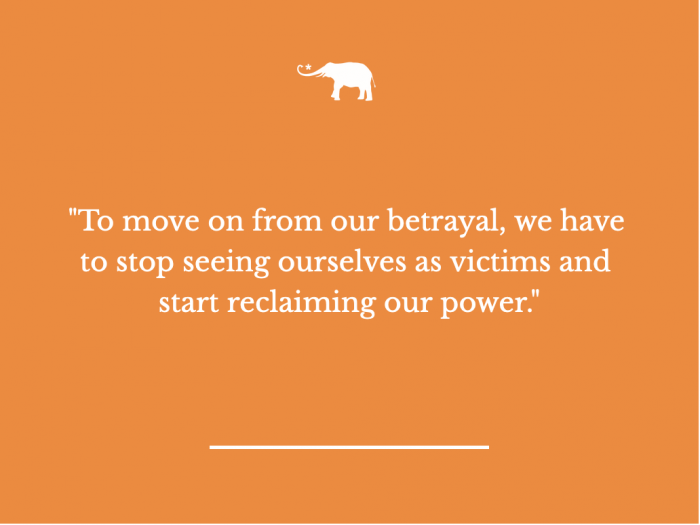“We didn’t want to bother you. We know how busy you are. And you don’t love the marketing side, anyway,” my wiser, older partner explained.
I didn’t really get a sense of how deep and painful betrayal could be until I engaged in my first business partnership—a yoga and healing center intended to bring together many disciplines under a one-stop roof.
Early on, there were just the two of us, a 50/50 partnership, and an equal say in decisions. But when she introduced the idea of adding a third partner, one of her former colleagues, I reminded myself to keep an open mind.
“Fine,” I thought after meeting the new partner. “Another voice in the mix for tiebreakers could be a good thing.”
Then, she brought in a marketing consultant.
“Sure,” I agreed. “We could use the expertise.”
My default position was to trust people at their word, and I went along with her suggestions as I imagined a supportive partner would.
I didn’t want to make anyone do extra work. And I was busy; she wasn’t wrong. I didn’t like marketing; she wasn’t wrong about that, either.
But, I didn’t see the plan she was formulating. It took less than six months before meetings between the three of them—my two partners and the marketing consultant—were held without my knowledge. Plans were made without my input, and the future of the business, the one part-owned, was being shaped without me.
The marketing consultant suddenly had a more influential voice than I did, even though she hadn’t been the one to invest thousands of dollars or the one who had rolled up the mat on her previous yoga business to fold it into this one.
By the time the three of them informed me about a collective decision that had been made without me, so much groundwork had been laid that I thought it was too late to offer my opinion without causing an inconvenience.
And I didn’t want to cause an inconvenience.
By the time I found the courage to say to my partner: “My intuition tells me you’re doing things behind my back,” and she replied, “Your intuition is off,” there was already blood pouring out of my back from the sharp knife of betrayal.
Betrayal comes without us seeing it—without any warning. It digs past our skin into our ribs, where it sinks and twists into our heart, leaving us slow-bleeding all day long, hunched over in protection, and vulnerable to future attacks.
Day after day, as I tried to navigate a partnership that was no longer a partnership, I experienced physical pangs in my heart, strong enough that I went to the doctor, worried about some kind of heart attack. These pangs might’ve been invisible to the eye, but they left scars all the same.
(Too bad doctors aren’t trained to diagnose for betrayal.)
It’s an invisible, painful injury.
Whether it’s a fictional king being betrayed by his closest allies long ago in “Macbeth” or a very real, modern-day 5th grader on a playground, the cold, sharp stabs of betrayal have a universal sameness. We all recognize it when it happens to us.
By adulthood, betrayal is no longer an unfamiliar sensation or experience in our bodies. Most of us can recount earlier experiences, replete with vivid bodily responses, decades later.
I remember being in junior high and realizing that my friend was now my “friend”—the girl I believed was my best friend was talking about me behind my back. She betrayed the confidences of our friendship, and my lips still curl up in disgust if I say her name decades later.
The path to betrayal frequently involves duplicitous behavior, or, at the very least, a lack of straightforward communication and honesty.
We usually think it’s behavior that someone else has done “to” us:
When someone is nice to our face but talks about us behind our back.
When someone lights up our social media or DMs with “you are soooooooo sweet” but actually doesn’t like us.
When someone presents themselves as “all ears” and all compassion, only to use the information against us later.
When a friend named June says, “I promise I won’t tell Kelly,” and then the next phone call you receive from June, she thought she was calling Kelly, and you’re the topic of the conversation.
But it’s the easy way out to pin all the blame on others. If we look closer, the hard truth is that most of the time, we’ve participated in our own betrayals.
When we find ourselves wrapped in betrayal, we have often overlooked our gut feelings about someone. We’ve blown past questions we should have asked or people we ought to have ousted from our life. We’ve steamrolled past nagging feelings or comments that didn’t sit quite right. We’ve ignored the insomnia, the nightmares, the stomachaches, the migraines.
Betrayal feels like we were caught off guard because we believed we were being authentic while someone else was not. But often, we failed to notice the truth about the connection; we were trying to be in service, trying to be nice or kind or “make things work.”
Inauthenticity is a betrayal. And as the guardians of our own authenticity, who are we betraying? Ourselves.
We aren’t taught the skills we know now—how to see what else is under the feelings and sensations of betrayal. Is there a lack of self-worth? A fear of speaking our truth? Do we believe, even subconsciously, that we don’t deserve better friends, lovers, or partners? Are we being as genuine as we think when we’re “in service of others?” Did we ignore a gut feeling or warning sign?
Until we ask ourselves these questions, we are leaving ourselves open to future betrayal. Because the universe wants us to learn something. The universe wants us to learn about authenticity.
The act of authenticity means we do not surprise others in business partnerships or friendships or romances, for we have spoken about our concerns and feelings along the way. We are in touch with our emotions in the present moment and don’t need to blow off steam in back rooms or Facebook groups.
We don’t miss out on participation in relationships for lack of skill in saying no or exactly what we mean.
Authenticity is difficult: it requires bravery, honesty, vulnerability, saying no, and being assertive.
When I finally tackled the truth of my failed business partnership, and particularly my sense of betrayal, I followed The Work by Byron Katie. The first thing I learned was how to take the beliefs I held about the other person and turn them around: into what it could show me about myself.
I realized that the person who had perpetrated and allowed the betrayal was: me.
I betrayed myself every time I chose to stand down instead of speaking my truth. I betrayed myself every time I gaslighted myself into believing that “if only we could be more honest with each other,” or “if only we could get back on the same page.”
The betrayal started and ended with me. I had to be the one to remove the knives from my back. I was, in fact, the only one who could.
Authenticity bites.
To become betrayal-proof, we need to build a consistent, daily practice of mindfulness, where we tune into our bodies in the present moment:
>> What is happening, what sensations do we need to inquire into?
>> What barely perceptible comment or event or happening could use some examination?
>> How can we tune into the feelings in our body rather than the person or the circumstance?
>> How do we feel?
>> What are we detecting?
>> What do we need to be more compassionate and authentic about?
We cannot change what others around us choose to do or say, but we can change how we respond. We can change our own reactions, participation, and conversations.
What would an authentic reaction or response look like, sound like, or feel like?
Are we saying things out loud to someone else that we are saying behind their back or stuffing into our body and pretending aren’t happening?
Can we emulate a female role model who is kind and supportive yet also direct and fearlessly confident when it comes to speaking from her authentic self and using her voice?
To move on from our betrayal, we have to stop seeing ourselves as victims and start reclaiming our power. No matter how small or shaky that first step, recognizing what we’ve learned and how we’ve grown through the experience is the best protection in the future.
A year after leaving that business partnership, I sat down with my tax accountant to walk him through the complicated paperwork of my exit.
When we were done, he looked at me with a look that was so gentle and even loving (a tax account. I know, right?), and he said, “No more business partnerships.”
I nodded, held back tears, and agreed.
~
For more from Janis.
For more from Keri.







Read 39 comments and reply